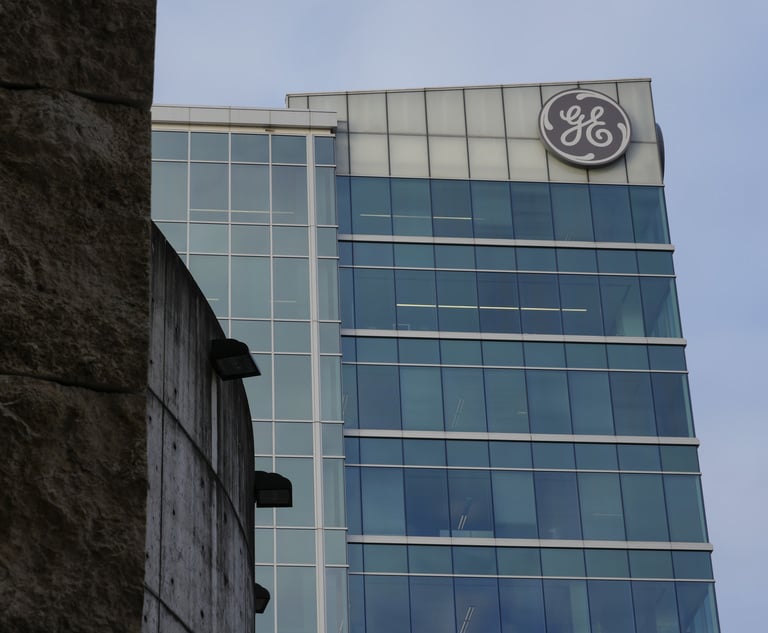 A Second Circuit courtroom at the Thurgood Marshall Courthouse, 40 Foley Square. Photo: Rick Kopstein/NYLJ
A Second Circuit courtroom at the Thurgood Marshall Courthouse, 40 Foley Square. Photo: Rick Kopstein/NYLJDistrict Judge's Ex Parte Talk With Jurors, 'Forbidden' Instruction Force Retrial, 2nd Circuit Rules
U.S. District Judge Thomas McAvoy's actions in a immigration and marriage fraud trial potentially tainted the jury, requiring the convictions be overturned and the case remanded, the appellate panel found.
March 21, 2019 at 05:34 PM
4 minute read
A guilty verdict in a marriage and immigration fraud trial out of the Northern District of New York has been vacated by the U.S. Court of Appeals for the Second Circuit, after the panel found the trial judge's ex parte communications with jurors and instructions ahead of deliberations raised too many concerns about the fairness of the proceedings.
“Although we do not question the judge's conscientiousness and good faith, we nonetheless conclude that his ex parte meeting with the jurors and his instruction about assessing the credibility of a testifying defendant were sufficiently sharp departures from the law of this Circuit as to undermine our confidence in the fairness of the trial,” the panel wrote.
U.S. District Judge Thomas McAvoy, a former chief judge in the district who joined the bench in 1986 and now holds senior status, handled the 2015 trial and conviction of Mary Opoka of marriage fraud, and her co-defendants Gaurav and Isha Mehta of both marriage and immigration fraud.
At one point during the trial, McAvoy's clerk alerted the judge to concerns being expressed by the jurors. The judge then went into the jury room, without alerting counsel to the parties, and had a discussion about defendants' presence outside of the courthouse, in ways some jurors suggested could have been threatening.
Key for the panel of Circuit Judges Barrington Parker, Debra Ann Livingston, and Denny Chin was McAvoy's comments in front of the jurors and the potential impact it could have on their thinking. McAvoy did not later tell counsel for the defendants that he used words such as “disturbing” and “inappropriate” in speaking with the jurors, nor did he disclose the fact he stated that, in his “years and years” of presiding at trials, the actions of the defendants were unusual.
Even after speaking with the defendants and hearing concerns about the ex parte communications, McAvoy did not ask if the jurors were discussing the concerns among themselves, nor did he ask them questions to determine whether their impartiality had been compromised by the concerns.
During the charging of the jury, McAvoy told the jurors they could take into account whether the defendant's interest in the outcome of the case created a motive for them to lie. Defense counsel did not, at the time, object to the instruction.
The panel found McAvoy's actions in speaking with the jury went against the law of the circuit meant to avoid situations pregnant with the possibility of error, where it was possible for a judge's comments to generate unintended and misleading impressions with jurors about what he or she thinks. This, the panel noted, was why jurors were supposed to put inquiries in writing. Instead, McAvoy found himself responding to unexpected questions in an uncontrolled environment, exactly what the circuit law sought to avoid.
That McAvoy failed to alert the defendants or their counsel before speaking with the jurors, and then after offer a less-than-full account of what had been discussed only compounded the problems. These problems were then further compounded by McAvoy's instructions that the jury could consider defendants' motives for possibly providing false testimony.
“We have repeatedly held, in no uncertain terms, that this charge is forbidden; district courts may not tell juries that a testifying defendant's personal interest in the outcome of a trial supplies a motive to lie,” the panel wrote.
For all these reasons, the panel said it was compelled to vacate the convictions.
“This case boiled down to the jury's determinations of the defendants' credibility. Based on our review of the evidence presented at trial, there is a reasonable probability that the errors complained of might have contributed to the convictions,” the panel wrote.
Patterson Belknap Webb & Tyler partner Harry Sandick represented Gaurav Mehta on appeal. Speaking on behalf of the original defendants' counsel, Sandick said the attorneys and their clients were pleased with the appellate panel's decision.
“As we argued on appeal, two important legal errors were made at trial,” Sandick said in a statement. “The Court recognized that these errors were prejudicial and required the reversal of our clients' convictions.”
A spokesman for U.S. Attorney Grant Jaquith's office declined to comment.
Related:
This content has been archived. It is available through our partners, LexisNexis® and Bloomberg Law.
To view this content, please continue to their sites.
Not a Lexis Subscriber?
Subscribe Now
Not a Bloomberg Law Subscriber?
Subscribe Now
NOT FOR REPRINT
© 2024 ALM Global, LLC, All Rights Reserved. Request academic re-use from www.copyright.com. All other uses, submit a request to [email protected]. For more information visit Asset & Logo Licensing.
You Might Like
View All
NY Appellate Panel Cites Student's Disciplinary History While Sending Negligence Claim Against School District to Trial

The American Disabilities Act, Sovereign Immunity and Individual Liability
7 minute read
GE Agrees to $362.5M Deal to End Shareholder Claims Over Power, Insurance Risks
2 minute read
Judge Denies Sean Combs Third Bail Bid, Citing Community Safety
Trending Stories
Who Got The Work
Michael G. Bongiorno, Andrew Scott Dulberg and Elizabeth E. Driscoll from Wilmer Cutler Pickering Hale and Dorr have stepped in to represent Symbotic Inc., an A.I.-enabled technology platform that focuses on increasing supply chain efficiency, and other defendants in a pending shareholder derivative lawsuit. The case, filed Oct. 2 in Massachusetts District Court by the Brown Law Firm on behalf of Stephen Austen, accuses certain officers and directors of misleading investors in regard to Symbotic's potential for margin growth by failing to disclose that the company was not equipped to timely deploy its systems or manage expenses through project delays. The case, assigned to U.S. District Judge Nathaniel M. Gorton, is 1:24-cv-12522, Austen v. Cohen et al.
Who Got The Work
Edmund Polubinski and Marie Killmond of Davis Polk & Wardwell have entered appearances for data platform software development company MongoDB and other defendants in a pending shareholder derivative lawsuit. The action, filed Oct. 7 in New York Southern District Court by the Brown Law Firm, accuses the company's directors and/or officers of falsely expressing confidence in the company’s restructuring of its sales incentive plan and downplaying the severity of decreases in its upfront commitments. The case is 1:24-cv-07594, Roy v. Ittycheria et al.
Who Got The Work
Amy O. Bruchs and Kurt F. Ellison of Michael Best & Friedrich have entered appearances for Epic Systems Corp. in a pending employment discrimination lawsuit. The suit was filed Sept. 7 in Wisconsin Western District Court by Levine Eisberner LLC and Siri & Glimstad on behalf of a project manager who claims that he was wrongfully terminated after applying for a religious exemption to the defendant's COVID-19 vaccine mandate. The case, assigned to U.S. Magistrate Judge Anita Marie Boor, is 3:24-cv-00630, Secker, Nathan v. Epic Systems Corporation.
Who Got The Work
David X. Sullivan, Thomas J. Finn and Gregory A. Hall from McCarter & English have entered appearances for Sunrun Installation Services in a pending civil rights lawsuit. The complaint was filed Sept. 4 in Connecticut District Court by attorney Robert M. Berke on behalf of former employee George Edward Steins, who was arrested and charged with employing an unregistered home improvement salesperson. The complaint alleges that had Sunrun informed the Connecticut Department of Consumer Protection that the plaintiff's employment had ended in 2017 and that he no longer held Sunrun's home improvement contractor license, he would not have been hit with charges, which were dismissed in May 2024. The case, assigned to U.S. District Judge Jeffrey A. Meyer, is 3:24-cv-01423, Steins v. Sunrun, Inc. et al.
Who Got The Work
Greenberg Traurig shareholder Joshua L. Raskin has entered an appearance for boohoo.com UK Ltd. in a pending patent infringement lawsuit. The suit, filed Sept. 3 in Texas Eastern District Court by Rozier Hardt McDonough on behalf of Alto Dynamics, asserts five patents related to an online shopping platform. The case, assigned to U.S. District Judge Rodney Gilstrap, is 2:24-cv-00719, Alto Dynamics, LLC v. boohoo.com UK Limited.
Featured Firms
Law Offices of Gary Martin Hays & Associates, P.C.
(470) 294-1674
Law Offices of Mark E. Salomone
(857) 444-6468
Smith & Hassler
(713) 739-1250






